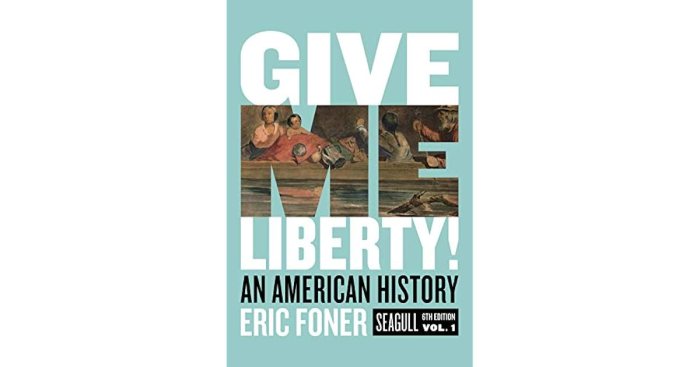Give me liberty 6th edition volume 1 – Give Me Liberty, 6th Edition, Volume 1, offers a comprehensive exploration of the historical significance, literary impact, rhetorical power, cultural influence, and visual representation of the iconic phrase “Give Me Liberty or Give Me Death.” This edition provides an in-depth analysis of the phrase’s evolution and its enduring relevance in American culture.
Through historical analysis, literary examination, rhetorical dissection, cultural exploration, and visual interpretation, this volume presents a multifaceted understanding of the phrase’s significance. It traces its origins in the American Revolution, examines its use in literature and speeches, and explores its role in shaping American values and identity.
Historical Context
The phrase “Give Me Liberty or Give Me Death” holds immense historical significance, deeply intertwined with the American Revolution and the fight for independence. Its origins can be traced back to the speech delivered by Patrick Henry at the Virginia Convention in 1775, a pivotal moment in the lead-up to the war.
Patrick Henry’s impassioned oration, known as the “Liberty or Death” speech, ignited a fire in the hearts of his fellow countrymen. His powerful words resonated with the colonists’ growing discontent and their determination to break free from British rule. The phrase “Give Me Liberty or Give Me Death” became a rallying cry, encapsulating the colonists’ unyielding resolve to fight for their freedom.
Literary Analysis
The phrase “Give Me Liberty or Give Me Death” has been immortalized in literature, finding its way into the works of renowned authors such as Mark Twain and Langston Hughes. In Twain’s novel “The Adventures of Huckleberry Finn,” the phrase is uttered by the character Jim, a runaway slave, expressing his yearning for freedom and his willingness to risk his life for it.
Langston Hughes, in his poem “Let America Be America Again,” uses the phrase to critique the racial injustices prevalent in American society. By juxtaposing the promise of liberty with the reality of oppression, Hughes challenges the nation to live up to its ideals and grant true freedom to all its citizens.
Rhetorical Impact: Give Me Liberty 6th Edition Volume 1
The phrase “Give Me Liberty or Give Me Death” possesses immense persuasive power, capable of stirring emotions and inspiring action. Its effectiveness lies in its simplicity and directness, conveying a clear and uncompromising demand for freedom. The phrase’s emotional appeal resonates with audiences, evoking feelings of patriotism, courage, and determination.
Throughout history, the phrase has been used by countless orators and activists to galvanize support for their causes. Its use in speeches and writings has played a significant role in shaping public opinion and mobilizing people to fight for their rights.
Cultural Influence

The phrase “Give Me Liberty or Give Me Death” has left an indelible mark on American culture, transcending its historical origins to become a symbol of freedom and national identity. It has been immortalized in art, music, and popular media, serving as a reminder of the nation’s founding principles and the ongoing struggle for liberty.
The phrase’s cultural significance is evident in its use on coins, postage stamps, and monuments. It has also inspired countless works of art, including paintings, sculptures, and songs. Its enduring popularity speaks to its enduring resonance with the American people.
Commonly Asked Questions
What is the historical significance of the phrase “Give Me Liberty or Give Me Death”?
The phrase is attributed to Patrick Henry, a prominent figure in the American Revolution. It encapsulates the determination and spirit of the American colonists who fought for their independence from British rule.
How has the phrase been interpreted and reinterpreted over time?
The phrase has been used in various contexts, from political speeches to literary works. Its meaning has evolved, reflecting changing societal values and perspectives on liberty and freedom.
What are some examples of how the phrase has been used to inspire and motivate people?
The phrase has been used in speeches by prominent leaders, such as Abraham Lincoln and Martin Luther King Jr., to rally support for causes related to freedom and equality.